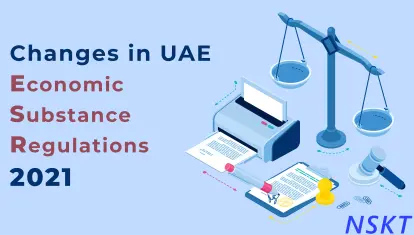Table of Contents
What do you need to know before filing ESR?
Recently the resolution of ESR was changed by the UAE Cabinet of Ministers from the ESR resolution of 2019 and issued an updated regulation through Cabinet Resolution No. 57 of 2020. This new regulation supplies firms with 1 January 2019, as the start of their financial years. Additional guidance for the New ESR was subsequently provided by the UAE Ministry of Finance from Ministerial decision No.100 of 2020. This resolution replaced the previous 2019’s Decision No. 215, and included a relevant guide of the updated Activities attached as an appendix. The Regulations and guidance applies to all UAE jurisdictions, including financial free zones such as the DIFC.
Key points mentioned in the Updated ESR include:
- Branches of any UAE company do not need to file separate ESR notification- The new ESR regulation states that when a UAE company has a branch in UAE with a single parent company for all of them. It is not required for all the branches to file the ESR notification separately. All that you have to do is file a single notification that will mention all your relevant activities of your parent company based in UAE along with the activities of all your branches.
- Licensees' definition changed- Licensees are required to comply with the New ESR, but its definition changed which now only applies to a corporate person, incorporated outside or inside of the UAE, or an unincorporated partnership where each partner much have a presence in the UAE and conduct a Relevant Activity.
A natural person, sole proprietor, trust, or foundation has been omitted from the list. The Licensees list also includes some exemptions such as investment funds, entities completely owned by residents of the UAE and which carry out their activities only in the UAE, Outside UAE tax residents' persons, foreign parent companies branches where the income is subject to tax outside the UAE.
Most of the entities owned by the government of the UAE are no longer exempted unless they fall within any of the exempted categories in the updated ESR.
Any Licensee who wishes to be benefitted from the exemption must provide evidence for the same.
- UAE branches of foreign companies are given relaxation for the reporting requirements- For any foreign company whose branch is registered in the UAE does not fall under the new ESR. Provided the income earned by the branch company must be subject to tax in the overseas jurisdiction.
- The definition changed for the group and connected person- Group and connected person’s definition have been changed which will impact the assessment of the headquarters business, service centre business and distributions, as well as relevant activities of the IP Business with high risk.
- The charge of compliance and control has been given to the UAE Federal Tax Authority- The National Assessing Authority to oversee compliance and control of the New ESR has been given to the UAE Federal Tax Authority.
- ESR notification needs to be filed with the UAE Ministry of Finance by Licensees- The new ESR states that if your business qualifies as a Licensee, your notification must be filed with the UAE Ministry of Finance through an online portal, within six months from the end of the financial year.
- Increased penalties- The New ESR has been updated with an increased penalty which also includes the administrative penalties for non-compliance. Penalties are as follows:
- In case of failure in report submission of failure in meeting the requirements of the tests in the first year, a penalty of AED 50,000 has been imposed.
- In case of failure in report submission of failure in meeting the requirements of the tests in the second year, a penalty of AED 400,000 has been imposed.
- In case the Licensee provides inaccurate information to the relevant regulatory authority or Federal Tax Authority a penalty of AED 50,000 to be imposed.
- In case a Licensee fails to submit the notification, a penalty of AED 20,000 to be imposed.
- Changed definition of relevant activity- There have been changes in the definition of relevant activities including Holding Company Business and Distribution and Service Centre Business.
- Economic substance reporting- Licensees who must meet the economic substance test should submit their Report of Economic Substance to the Ministry of Finance within 12 months after the end of the financial year for the Licensee. The report must contain the following information:
- Type of Relevant Activity conducted
- Type and Amount of gross income incurred from the Relevant Activity
- Type and Amount of assets and expenses operating with respect to the Relevant Activity
- Location of the relevant activity of the business and, if applicable, property, plant, or equipment used for conducting the Relevant Activity.
- Number of full-time employees with qualifications and number of personnel who are responsible for carrying out the Relevant Activity
- Core Income-Generating Activity in respect of Relevant Activity being carried out by it
- Financial statements
- Declaration by the Licensee if the business satisfies the economic substance test.
The new ESR regulation requires the Licensee to undertake immediate action to achieve compliance. Therefore, it is a must for all Licensees to revisit their earlier classification of ESR to check them with the newly updated regulations and analyze their current situation to know whether they fall within the purview of the revised regulations and if so, they must prepare for resulting compliance requirements accordingly.
NSKT Global is a top firm in UAE for ESR Compliance, reporting, and filing, would be pleased to assist you in your endeavor to be ESR compliant by assessing your business activities under the new regulations and providing support throughout navigating the ever-changing UAE regulatory landscape.





